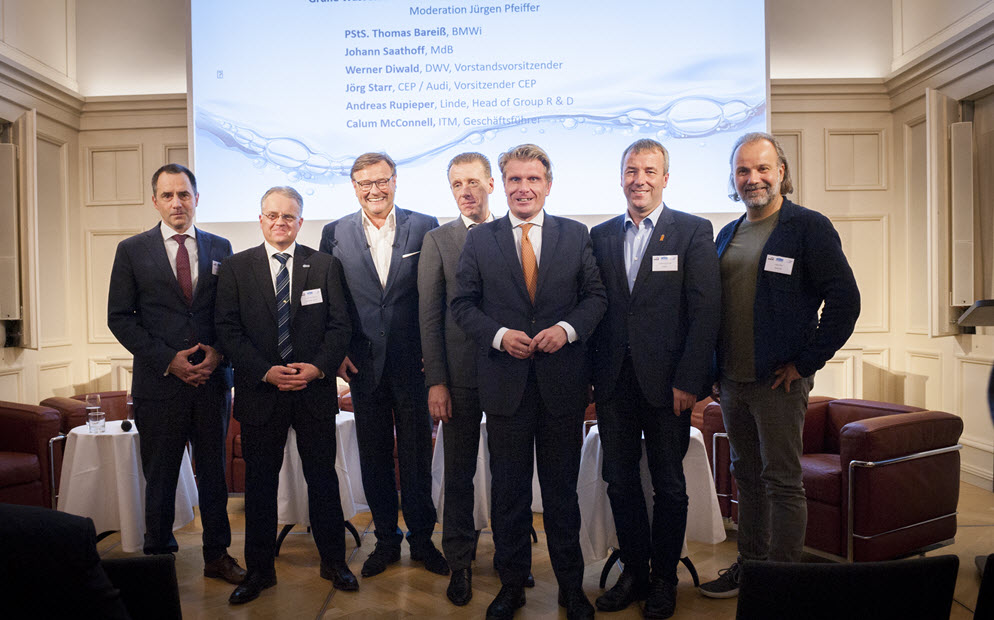
A Clear Message from Industry to Government from DWV, DVGW, and CEP
Joint presentation by DWV, DVGW, and CEP sets new benchmarks
For the first time since the stakeholder conference on the National Hydrogen Strategy organized by BMWi, BMVI, BMBF, and BMZ, leading protagonists from industry and associations have strongly promoted a directional structure for the National Hydrogen Strategy. The message to politicians from the National Hydrogen and Fuel Cell Industry Association (DWV) and Clean Energy Partnership (CEP) for the mobility sector and their member representatives was more than clear.
For a near-term, efficient market introduction of green hydrogen, the German government will have to set out a specific national action plan with binding targets in the National Hydrogen Strategy. This became particularly clear in the top-level panel discussion: a rapid market ramp-up of the hydrogen industry is not only the key to successful energy and mobility transition. A rapid market ramp-up is the economic policy instrument that will make it possible to sustainably help shape regional structural changes and to jointly create new success stories. And so, specific proposals were discussed that would have to be included in a National Hydrogen Strategy with an industrial policy aspiration.
The Parliamentary State Secretary at the Federal Ministry for Economic Affairs and Energy, Thomas Bareiß MP, also stressed the importance of the National Hydrogen Strategy in his statement: “The National Hydrogen Strategy not only addresses all sectors such as industry, mobility, and heating but also integrates the entire industrial value chain. This is another important step in the energy transition. So with this step, the Federal Government is setting a new focus, continues to build on German strengths, and sets the framework for the long-term success of our core industrial sectors.”
Werner Diwald, Chairman of the Board of the DWV, got even more specific, saying that an ambitious and target-oriented National Strategy for Hydrogen could lay the foundations for a rapid market ramp-up of the hydrogen industry, which would result in the creation of more than 100,000 new jobs in Germany. These are jobs that, given a determined/resolute industrial policy, can also be established in economically underdeveloped regions. So in truth we are talking about a National Hydrogen Industry Strategy.
Referring to the future significance of the hydrogen industry for the mobility transition, CEP Chairman Jörg Starr said: “As a fuel and storage medium, hydrogen is an essential component of a sustainable energy transition across all sectors. Mobility, as the initial market, has shown that the technology has reached market maturity. If Germany is to remain competitive as a business location and innovation driver, policymakers and industry must now join forces. Together, we must ensure a successful market ramp-up by designing an appropriate regulatory framework.”
Industry is all set to go
In the fascinating discussion between the experts, it was also mentioned several times that the German industry is ready and waiting for the starting signal from the government to initiate the market ramp-up of the hydrogen industry through high levels of investment. To this end, and this was made just as clear, the German government must create reliable framework conditions as quickly as possible.
In his statement, Johann Saathoff, who took part in the panel discussion in his capacity as energy policy coordinator of the SPD parliamentary group, summed up the situation as follows: “We must make the best possible use of the opportunity presented by the National Hydrogen Strategy to formulate a specific framework for the hydrogen economy that is oriented towards future needs.”
The enormous interest and the discussions at the Parliamentary Evening made it clear that action must now be taken to quickly create all the conditions for a prompt market launch of hydrogen technologies in Germany. For this reason, the DWV has already developed a proposal for an efficient market design that will enable an industrial transformation into a low-emissions economy, and presented it to policymakers.
Read the most up to date Fuel Cell and Hydrogen Industry news at FuelCellsWorks




